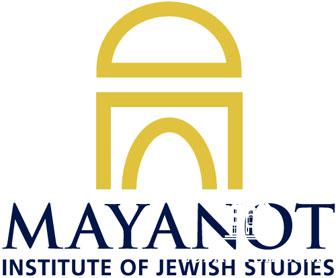(Lubavitch.com/LNS) The graduating senior has had her last Chabad on campus Shabbat dinner; the birthrightisrael experience is over. But the idea is to keep that enthusiasim for Jewish education alive, and to sustain active interest and further Jewish growth. So what now?
A new women’s institute of higher learning in Israel that opens its doors January 2nd begins to answer this question. Thirty women are registered to attend the first semester of Mayanot Institute of Jewish Studies Women’s Program in Jerusalem.
For years, college age women, birthright israel leaders, and Chabad on campus representatives have been clamoring for a women’s counterpart to the Mayanot Institute of Jewish Studies men’s program. Known for offering serious text based study in a spiritual, warm, non-dogmatic setting, Mayanot has attracted college grads and professionals to its year round programs for men since 1997, which was established with the support of founding chairman, Rabbi Joseph Gutnick in partnership with Colel Chabad. Now with the help of the Rohr Family Foundation, and Chairman of the Board Mr. Jeffrey Cohen, women are getting the keys to a Mayanot experience of their own.
Students will be active partners in “bridging the interface between the heritage of Judaism and today’s world” at the program, Rabbi Shlomo Gestetner, Dean of Mayanot explained. Women’s program study halls will hum with the exchanges of students paired as chavrutot, digging into and discussing the meaning of classic Jewish texts. The goal: to let students discover, not passively absorb, the development of a Jewish practice from its source to its application.
The program offers “a unique synthesis of serious learning and spirituality, with a strong academic foundation,” said Rabbi Gestetner. A growing trend of “women engaging in serious Jewish learning, makes this type of program definitely welcome.”
Respecting the intellectual integrity of the students and trusting their ability to grow at their own pace is central to the school’s philosophy. Rabbi Meir Levinger, director of the Women’s Program, emphasized that the school is not looking to fit students into a mold. “We are not saying, ‘Come to us. We have the answers.’ Rather, ‘Come to us. We will share the skills so you can reach conclusions by yourself.’”
With enrollment open to all Jewish women, ages 20-28, with no prior Jewish educational experience or observance required, Rabbi Levinger designed a curriculum to rapidly hone textual skills while maintaining an atmosphere that is open minded and fulfilling spiritually and emotionally. An intensive Ulpan program is offered at the Women’s Program to up Hebrew comprehension toward the goal of independent study. These skills will be put to use in coursework that includes Torah, Talmud, and Kabbalah.
Adding heart to this heady atmosphere are the Mayanot educators. Steeped in the spirit of Chabad Lubavitch, teaching at Mayanot answers a calling to share with students a love for Torah study. Teachers – mostly women, all veteran educators – will open their homes, and invite students to share their lived Jewish experience, which they believe is as much a part of the Women’s Program experience as taking apart a page of Talmud.
Other windows in this ivory tower of lofty studies include plans for students to tour the land and take on leadership roles to help the community. Students will explore mountaintops and valleys as they crop up in the texts, bringing the passages they study, to life. They’ll stow their rucksacks and canteens to interact with Israelis and participate in community projects. Volunteering for important causes is integral to the program.
“We are very focused on deepening a sense of responsibility to Am Yisrael,” said Rabbi Kasriel Shemtov, Executive Director of the Institue. Students will emerge from Mayanot “knowledgeable and passionate about Judaism and the Jewish future.”
It’s a goal that accounts for why Mayanot’s teachers will be offering a course on the Israeli-Arab conflict. The 24-week leadership-training course, developed by the Avi Chai Foundation, promotes, according to the foundation’s website, a “fair and honest understanding of the Arab-Israeli conflict… to counter the ideological assault on Israel” on college campuses and in the community.
Mayanot’s women’s yeshiva—in a building in the Rechavia-Nachlaot neighborhood, gives students a quaint and colorful, old Jerusalem backdrop for their studies. With everything now in place for the program's opening, the school is short only on desks. Assistant director Rivka Marga Gestetner says she anticipated an initial enrollment of ten students, but the demand for spaces at the program quickly surpassed that number.
Students referred by Chabad-on-Campus representatives like Rivka Slonim at SUNY Binghamton and Chanie Goldman of University of Florida, Gainesville, make up about 50% of the first class. Australian and South African university students free during the southern hemisphere’s summer vacation have signed up, as have those who recently concluded their birthright israel trip. Another subgroup of students in the first class is career women pressing pause on their way up the ladder to study in Israel.
Mature students will appreciate the school’s philosophy that allows them to manage their own journey, with teachers as role models eager to share but not to impose their worldview. Unlike schools open to immediately post-high school grads, there are few rules of conduct outside of class and no dress code.
Rabbi Gestetner told Lubavitch.com: “Our experience at Mayanot [for men] has taught that trusting the students without expecting a certain level of observance allows them to grow, not by trying to be someone else, but themselves in a deeper, more spiritual way.”

Be the first to write a comment.